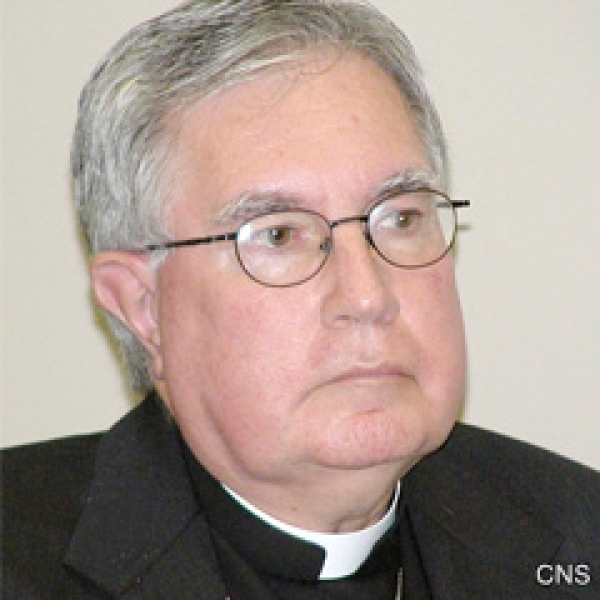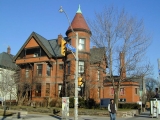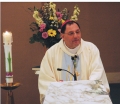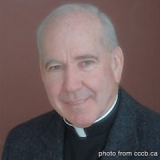He's still a bishop and the proper title is still "The Most Reverend" Raymond Lahey, but the former bishop of Antigonish, a confessed hoarder of child porn, is very likely to set canon law history by being dismissed from the clerical state.
New norms to deal with priests who use child pornography became Church law just a year ago. In May 2010 a new list of grave acts to be judged by the Congregation for the Doctrine of the Faith (CDF) included the possession, acquisition or distribution of pornographic images of a minor under 14 years old for the purposes of sexual gratification by whatever means and using whatever technology.
Lahey is likely be the first bishop transferred to the lay state (defrocked) as a punishment for possessing child porn after he pled guilty to charges in an Ottawa courtroom May 4.
It's hard to say how long it will take, but the congregation has a clear mandate from Pope Benedict XVI to prosecute such cases, said Chad Glendinning, a canon law professor at Ottawa's Saint Paul University.
Bishop Lahey goes directly to jail after guilty plea
By Deborah Gyapong, Canadian Catholic NewsOTTAWA — Bishop Raymond Lahey pleaded guilty to the importation of child pornography May 4 and went directly to jail after he asked the judge to be incarcerated while awaiting his sentence hearing.
The former Bishop of Antigonish, N.S., faced two child porn charges, but the Crown and defence counsel agreed to drop the more serious charge of possession of child pornography for the purpose of transmission. Lahey's lawyer told the court there was no distribution involved.
Lahey faces a minimum mandatory sentence of one year in jail and possibly up to 10 years.
He also faces dismissal from the clerical state, or defrocking as it was once known, from the Vatican. In a statement yesterday, the Vatican restated its condemnation of sexual exploitation in all its forms, particularly crimes against minors.
"Although the civil process has run its course, the Holy See will continue to follow the canonical procedures in effect for such cases, which will result in the imposition of the appropriate disciplinary or penal measures," said the statement.
Toronto Anglicans explore joining Catholic Church
By Michael Swan, The Catholic RegisterTORONTO - Practical steps toward establishing an Anglican Ordinariate for Canada were taken at the University of Toronto’s Newman Centre May 1.
About 25 Anglicans and ex-Anglicans met to discuss their personal decision to seek union with the Catholic Church and how they would fulfill the conditions of Anglicanorum Coetibus, the apostolic constitution which governs how groups of Anglicans will be able to retain Anglican liturgical and pastoral traditions even as they become Catholics.
Ex-Anglican Canadians have been asked to send individual letters to Toronto Archbishop Thomas Collins by May 31 seeking inclusion in the Anglican Ordinariate. This will indicate to Collins how many people would eventually make up the ordinariate. The ordinariate is analogous to a diocese without the usual territorial borders.
March for Life is a true celebration of motherhood
By Vanessa Santilli-Raimondo, The Catholic RegisterComing on the heels of Mother’s Day, Deborah Morlani believes the timing couldn’t be more right for the National March for Life.
"It’s perfect timing for women to be showing that they’re proud to be mothers and that motherhood is a blessing," Morlani, a pro-life speaker and Catholic writer, told The Catholic Register.
The annual National March for Life takes place in Ottawa May 11 through 13, mere days after Mother’s Day. This year’s theme is "Abortion kills a human being." The aim of the march is to promote respect for life at all stages, from conception to natural death.
Morlani, along with taking part in the march, will be among the guest speakers at the march’s youth conference on May 13.
"I was conceived in rape when my mother was raped when she was 16, so I’ll be sharing my testimonial with youth," she said. The title of her talk is "Every human being deserves a chance at life: no exceptions."
Campus ministry group faithful to canon law
By Catholic Register StaffThe Canadian Catholic Campus Ministry (CCCM) has been recognized as a national private association of the faithful according to the Code of Canon Law by the Canadian Conference of Catholic Bishops.
CCCM is now one of only two national associations to be recognized as a private lay association of the faithful by the Canadian bishops. The Catholic Women’s League was recognized in 2005.
“We are honoured to have been recognized in this way by the bishops,” said Fr. Daniel Renaud, CCCM board chair.
Pro-life message under threat on campus, producer says
By Deborah Gyapong, Canadian Catholic NewsOTTAWA - When the producer of the pro-life movie Bella saw a video of police handcuffing Ruth Lobo and four other students and pushing them into a police wagon, he wept.
Lobo, who heads up Carleton Lifeline, the university’s pro-life club, her fiancé James Shaw and three others were arrested for trespassing last fall on Ottawa’s Carleton University campus after trying to mount a Genocide Awareness Project (GAP) display of photographs comparing abortion to genocide.
“When I saw that officer just ignore the rule of law, I began to cry,” said Jason Jones, who spoke April 30 at a fundraiser for Lobo, Shaw and the Canadian Centre for Bioethical Reform at Notre Dame Cathedral. The Calgary-based pro-life organization created the GAP project
Jones produced the acclaimed film Bella, a small budget film that drew rave reviews when it was released in 2008. It also took the People’s Choice Award at the 2007 Toronto International Film Festival. The film tells the story of a young unmarried waitress fired from her job after she becomes pregnant and the cook who commits to helping her and ultimately convinces her to have the baby.
Rosarian monks bring contemplative practice to London diocese shrine
By Vanessa Santilli-Raimondo, The Catholic RegisterAt Our Lady of the Rosary Shrine in Merlin, Ont., you’ll find trails dedicated to the rosary, saints, approved apparitions and the Stations of the Cross. And helping you through these trails, you’ll also find three monks from Sri Lanka — the very first of their order to come to Canada.
Since last July, Fr. Francis Jeyaseelan, Shrine director, and two other monks from Sri Lanka, Frs. Arulthas Mariyanayagam and Anthony Kamalathasan, have been living in a monastery on the grounds of Our Lady of the Rosary Shrine. Members of the Rosarian Order, a contemplative order, this is their first foundation outside of India and Sri Lanka. The order was founded by Fr. Bastiampillai Anthony Thomas in 1928 in Sri Lanka.
“The Congregation of the Rosarians in their General Chapter in 2006 decided to extend their monastic and prayer apostolate to other parts of the world in order to give a witnessing life of prayer and penance,” Jeyaseelan told The Catholic Register.
The Rosarians also strive to do reparation for the sins of the world by praying before the exposed Blessed Sacrament, he said.
P.E.I. diocese undergoes corporate reorganization
By Michael Swan, The Catholic RegisterBishop Richard Grecco and the diocese of Charlottetown no longer own all the Catholic parishes in Prince Edward Island.
The diocese of Charlottetown, which covers all 49 parishes on Prince Edward Island, has reorganized itself so each parish is now separately incorporated as a non-profit, charitable corporation. In the old “corporation sole” arrangement, the parishes were, legally speaking, the property of the diocese, and thus of the bishop.
This kind of corporate reorganization has been gradually taking place across Canada since a Dec. 14, 2005 letter from then-apostolic nuncio Archbishop Luigi Ventura to Canada’s bishops asking them to abandon the corporation sole and bring their corporate structures into line with the Church’s 1983 Code of Canon Law.
The big motivator for the change has been the recent history of lawsuits and bankruptcies over sexual abuse cases.
“If there is a court case and the court demands a huge sum, they demand that the diocese use all its assets to pay it,” explained Grecco. “Well, the parishes belong to the diocese’s assets.”
Catholic vote makes difference in Conservative victory
By Deborah Gyapong, Canadian Catholic News OTTAWA - English-speaking Catholics helped ensure a Conservative majority in the May 2 federal election, but the historic surge in Quebec by the NDP signals a preference of state over church in French Canada.
OTTAWA - English-speaking Catholics helped ensure a Conservative majority in the May 2 federal election, but the historic surge in Quebec by the NDP signals a preference of state over church in French Canada.The NDP won a record-breaking 58 seats in Quebec, leaving the Bloc Quebecois with just four MPs, well below official-party status in the new Parliament. This triumph by the NDP “sends a signal that Quebeckers still strongly believe in the state” and put their focus on government rather than “the grassroots organizations of civil society,” said McGill University historian John Zucchi.
The Conservatives swept to a majority with 167 seats. The NDP will form the official opposition with 102 seats, compared to 34 Liberals, four BQ and one Green Party seat.
The anti-church trend in Quebec sets it apart from much of the rest of Canada. An Angus Reid poll released April 22 indicated 59 per cent of English-speaking Catholics who attend church weekly intended to vote Conservative. Half of other Catholics also said they would vote Conservative. Those preferences seemed to stand up on election day and reflected a trend identified in the last two elections in which the Liberals saw erosion of two main pillars of support: Catholic and ethnic voters.
Ethnic vote takes Harper to majority promised land
By Michael Swan, The Catholic RegisterTORONTO - Once a Liberal bastion thanks to immigrants, ethnic voters in Toronto have given Conservatives the majority they sought.
"The Conservative ethnic ground game paid off in the end," said Jonathan Luk, the graduating president of the University of Toronto Chinese Catholic Community.
Chinese voters in both the 416 and 905 regions responded to values the Conservative Party championed, Luk said. The party took 30 of 44 Greater Toronto Area seats, a key component in gaining a majority government after Stephen Harper presided over two consecutive minority governments.
"When we talk about basic issues — the safety of our society, being tough on crime, respect for tradition and respect for hard work — these are values that Chinese people value," Luk said. "I also see Catholic voters are no different when it comes to those things."
For Tamils, who found themselves featured in an early Conservative attack ad, the community is hoping the new NDP official opposition and the first-ever Tamil Member of Parliament can hold the Conservatives to account for its immigration policies, said Jessica Devi Chandrashekar.
"Those who came out and voted were people who have bared the brunt of the recession and have been unable to reunite with their families because of the Conservative immigration policies," said Chandrashekar. "In Scarborough-Rouge River, a riding comprised mostly of the ethnic vote, (voters) made history in electing Rathika Sitsaiebasan for the NDP. Rathika is the first Sri Lankan Tamil MP elected outside of Sri Lanka. This has enormous significance for Tamil Canadians."
Chandrashekar is one of a new generation of voters, some of whom responded in this election in ways never seen before. Vote mobs organized on Twitter and Facebook swept university campuses, demanding young people seize the power of the ballot.
"I am 27 years old and born in Canada. This was my first time voting," said Chandrashekar. "I am looking forward to becoming more involved in the political process in Canada and the continued changes that the election in 2015 will bring."
The peace vote in Toronto was not overjoyed with the Conservative majority.
"A Conservative majority would be a bad thing for the cause of peace," wrote Deacon Steve Barringer of Pax Christi Toronto in an e-mail as results came in on election night. "They have a poor record of listening to interest groups of any kind."
Pax Christi plans to ramp up its protests in response to Conservative military and foreign policy.
"We will be looking at more aggressive programs, up to and including demonstrations and even civil disobedience against what we believe may be immoral policies," Barringer said.
Barringer puts his hope in a strong opposition from the New Democrats.
"We believe that Mr. Layton will listen," he said.
Catholic eco-theologian and University of Toronto religious studies professor Stephen Bede Sharper is also putting his hope in the NDP opposition, bolstered by the first-ever Green Party seat in Parliament.
"With the NDP's emergence, we now have a solid shot at a party that constitutes a real opposition to the Harper government, with the issues of social justice, workers' rights and the widening gap between rich and poor constituting central, rather than ancillary, political concerns," Sharper wrote in an e-mail to The Catholic Register.
Alberta missionary bishop headlines Tastes of Heaven gala
By Sheila Dabu Nonato, The Catholic RegisterTORONTO - Grouard-McLennan Archbishop Gérard Pettipas, C.Ss.R., headlines Catholic Missions In Canada's 10th anniversary Tastes of Heaven Gala May 5.
Pettipas will be the event's keynote speaker at the dinner to be held at the Paramount Event Centre in Woodbridge, Ont. The annual dinner helps to raise funds for the Catholic Church in Canada's missionary territories.
Pettipas will recount the faith journeys of the First Nations peoples living in Northern Alberta missions. He said in Canada's northern dioceses, “the needs of doing ministry are greater than the revenue that we take in to be able to serve those places.”
Many are isolated by distance and other missionary bishops have spoken of the challenge priests face in celebrating Mass in these communities.










